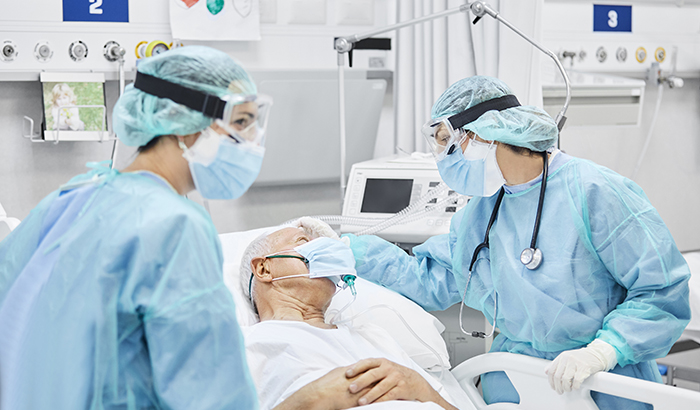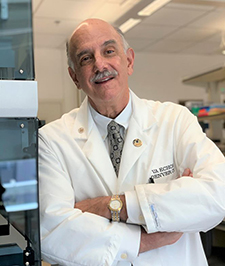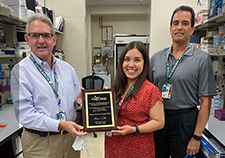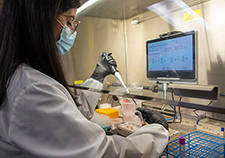Office of Research & Development |
 |
Office of Research & Development |
 |


VA CURES is led by infectious disease, critical care, and pulmonary experts in VA, with the program’s studies evaluating drugs for different stages of COVID-19 infection. (Photo: ©iStock/Morsa Images)
September 2, 2020
By Mike Richman
VA Research Communications
"This coordinated effort for controlled trials is very important so we can develop an infrastructure within VA to show what works with our patients.""
VA is launching a new initiative aimed at giving Veterans faster access to potential COVID-19 treatments and confirming their effectiveness.
VA CURES—the “VA Coronavirus Research and Efficacy Studies”—is a master protocol. It offers a standardized framework for studies on many potential treatments for COVID-19, without the need for a new study design and protocol each time. Over the coming months, VA CURES studies will evaluate drugs for different stages of COVID-19 infection, from the prevention to outpatient and inpatient stages.
About 25 VA medical centers are participating in VA CURES. The program is led by infectious disease, critical care, and pulmonary experts in VA.

Dr. Edward Janoff, an infectious disease specialist at the VA Eastern Colorado Health Care System, is co-leading the first trial on convalescent plasma. (Photo by Terri Rorke)
“This coordinated effort for controlled trials is very important so we can develop an infrastructure within VA to show what works with our patients,” says Dr. Edward Janoff, an infectious disease specialist at the VA Eastern Colorado Health Care System.
VA CURES studies will evaluate new treatments, such as antiviral agents and drugs that impact the immune system. Some trials may include outpatients with mild symptoms to prevent their progression to hospitalization. The VA CURES team also plans to prioritize preventive measures for Veterans who would be at high risk for illness should they become infected.
“We will begin by carefully evaluating treatments to study that we think have the best chance of bringing about an effective treatment not only for Veterans but also for other people,” says Dr. Sheldon Brown, an infectious disease specialist at the James J. Peters VA Medical Center in the Bronx, New York. “That’s our immediate priority. The only thing we can rely on is good quality evidence. That’s exactly the purpose of having a program like VA CURES. We want to obtain the best quality evidence we possibly can so people are not misled about a benefit or the potential harm of a treatment when, in fact, it may be something that’s important to help them.”

VA center training the next generation of researchers in blood clots and inflammation

AI to Maximize Treatment for Veterans with Head and Neck Cancer

VA researcher works to improve antibiotic prescribing for Veterans

VA’s Million Veteran Program played crucial role in nation’s response to COVID-19 pandemic
In the first VA CURES clinical trial, researchers are studying convalescent plasma for treating seriously ill COVID-19 patients. Convalescent plasma is the liquid part of the blood that contains antibodies, which are proteins the body makes to fight infections, such as COVID-19. It is donated by people who have recovered from COVID-19.
Some 700 Veteran volunteers with COVID-19 who are hospitalized at VA medical centers are being enrolled in the trial, which Janoff and Brown are leading. The study team is randomizing half of the patients to receive convalescent plasma. The others are receiving a saline placebo. Both the study team and patients are blinded to the form of treatment.
The study will determine whether convalescent plasma donated by Veterans and others can help COVID-19 patients recover when it’s infused into their blood. The key outcome measurement is how many patients experience respiratory failure or die from any cause by day 28. A secondary outcome is time to recovery within the 28-day period.
Earlier this year, the U.S. Food and Drug Administration (FDA) authorized use of convalescent plasma as an investigational treatment for COVID-19 through the FDA’s expanded access program. That program was used widely throughout the nation, including about 80 VA sites, as an approach for seriously ill patients who have few, if any, options left. It ended last month. The FDA has now authorized emergency use of the therapy, based on the available scientific evidence to date. That means not only can researchers use convalescent plasma for investigational purposes, but health care providers can also use it for hospitalized patients with COVID-19.
“This trial will go a long way toward helping in the fight against COVID-19,” VA Secretary Robert Wilkie said in a press release. “VA CURES will provide valuable information that will benefit our Veterans who are battling COVID-19, as well as other patients and the medical community in general.”
Each VA CURES study, Janoff explains, will build on the preceding trials and involve patients with different levels of disease severity. “These clinical trials are carefully designed studies to prove what does and what doesn’t work for optimal care of patients with COVID-19,” he says. “Convalescent plasma is the first of a number of studies. We will verify what the outcomes are before we move on to another study.”
VA CURES has a cadre of committed VA investigators with technical expertise.
“I’ve been extremely impressed with the resources VA has on hand and has brought to bear for the design and implementation of this study, and to assure the safety of Veterans in the trial,” Janoff says. “We have joined experts in study design, pharmacists, people who collect and manage the data, and those who work at VA sites identifying how many patients are available, so we select the right sites for the trial. The study is well supported by VA research and clinical programs to assure that as a result of this research, VA will be able to provide well-validated treatments to improve the health of our Veterans.
“VA CURES also supports early-stage investigators who want to work in VA to provide the best care for Veterans,” he adds. “This is an unprecedented opportunity for clinician-researchers to launch and maintain a productive career within VA and to establish the best and safest treatments for Veterans and, ultimately, the community.”
VA Research Currents archives || Sign up for VA Research updates